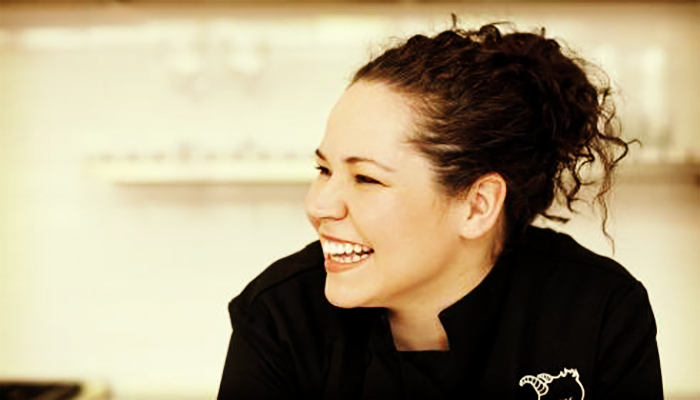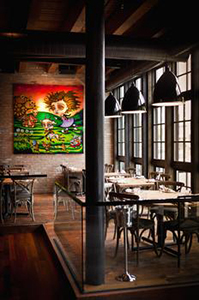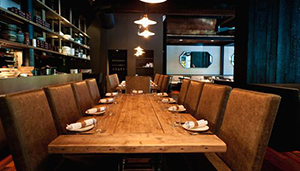
Stephanie Izard is a woman of passionate decisions that have propelled her to well-deserved success as one of the country’s top chefs. On the way back to Scottsdale from Ann Arbor, she stopped off in Chicago for three days, fell in love with her city of origin and decided not to leave. She worked for Jean-Georges Vongerichten at Vong, then Shawn McClain at Spring, then Dale Levitski at La Tache before opening her own restaurant, Scylla, in 2006.
Despite its success, Izard closed Scylla’s doors two years later to compete in Top Chef (Season 4). After becoming the first woman in the history of the show to take the title, she opened Girl & the Goat in Chicago’s West Loop. Izard and the restaurant have garnered numerous accolades, none more impressive than the “Best Chef: Great Lakes” win from the James Beard Foundation in 2013.
Izard crafts fun, farm-focused and globally inspired cuisine at Girl & the Goat. (The name itself is a play off Izard’s own surname, which is also a type of goat found in the Pyrenees). In 2012, the 37-year-old chef opened Little Goat Diner, a small restaurant, coffee shop, bar and bakery concept located right across the street from Girl & the Goat.
These days, Izard is one of Chicago’s most wanted toques, a role that keeps her endlessly occupied with special dinners and projects. It’s a position that also helped her earn an induction into the Chicago Culinary Museum & Chefs Hall of Fame this year. “Honestly,” says Izard, “my first thought was, ‘I’m old enough to be in a Hall of Fame? Oh, cool.’”
Busy as she might be hanging plaques and planning menus, Izard still found time recently to wash the dough off her hands to sit down in Little Goat’s sunlit upstairs dining room and chat with us about her farming background and her city’s culinary future.
When do you first take an interest in cooking?
I always say that, people who are chefs, their parents were either really good or really bad and they had to fend for themselves. But I was really lucky. My mom was a really good cook and we always cooked things from all over the world. My mom used to always tell me this story of when we went to Epcot [Center in Orlando] when I was 8 and we ate in France [Pavilion]. We ate these crêpes that had ham and a cheese sauce and mushrooms inside. We got home and I used her recipe book to figure out how to make crêpes and kind of recreate what we ate. After that, my sister and I were always in the kitchen cooking with my mom and it was just something that we did. We would look through all her recipes and plan a menu for the week and eat things like tempura. My mom used to make things like moo shu pancakes and moo shu pork. We ate things from all over, so I think I just grew up exposed to a lot. But then I went to college anyways because I thought that that’s what you’re supposed to do. I didn’t find anything I liked, so I ended up going to Scottsdale Culinary Institute and that’s when I started cooking professional.
You make a point of visiting all the farms you work with. Do you have a background in farming?
I think it’s more so that I didn’t grow up on a farm in any way, shape or form. My parents had a really awesome garden, so we would go pick vegetables for dinner and things like that, but I never had a green thumb, so it’s amazing to me what people can do. I grew a garden this year and I don’t even know what it looks like right now. It probably looks terrible. But I was actually at Spence Farm yesterday for the Spence Farm Foundation dinner. It’s this farm that we work with and they have this thing we help them create called Chef Camp, where chefs go down and they spend a couple days on the farm. They get to wake up early in the morning and move the pigs around and go pick squash blossoms, which is such a pain. I got to pluck a chicken for the first time. I’ve never killed a chicken. It was weird. And then we cooked it for dinner. So, I more so wanted to learn about what our farmers do, so that’s why we go to visit them. And each time I go, I try something out. We’ve done a pig kill before and we try picking all different kinds of vegetables. We go to the farms because we’ve developed relationships and they’re our friends and we want to go say, “Hi.” It’s fun, but [we] also [go] just to learn how they do that, because it’s hard and it’s a totally different world from where I’m from. I got to milk a cow at Kilgus Farmstead, where we get our goats from. I got to milk my first cow, which was one of my lifelong ambitions. [One of the farmers] was like, “I’ve never seen somebody so excited to milk a cow. We do this, like, twice a day.” Except, obviously, they don’t do it by hand anymore.
How have you watched the Chicago food scene change over the years since you first returned?
There are so many restaurants now. I always think of it like a little family tree. You have Rick Bayless and Paul Kahan and a chef I used to work for, Shawn McClain, who has now moved to Vegas, and [the late] Charlie Trotter — people who paved the path for Chicago. And now people that worked for them have grown off into a little tree and the next generation is emerging and opening restaurants. And now, as soon as you open a restaurant, the first question people ask is, “What’s your next restaurant going to be?” It’s like, is it not OK anymore to just have one? So, it’s interesting to see. A lot of chefs here now have multiple restaurants, and a lot of chefs that were fine dining have more casual restaurants or at least have a fine dining and a more casual [eatery]. So, it’s fun to see it’s going more in that direction.
How would you describe your own culinary style and do you feel like it has changed through the years?
I think it’s still evolving. It’s funny. I’m putting a dish on the menu today that was on our menu last year. And, following the recipes from last year, I was like, “This is really not balanced. It needs to be better. It needs more flavor.” So, whenever we bring back old dishes, we end up adjusting them because I think my style has turned into more bold flavors. And maybe it’s because I’m always searching for more inspiration, but I have more cultural influence now. I will pick a country and read about it and be like, “Oh, cool. Moroccans like to use ras el hanout.” So, now we have the Razzle, we call it. It’s our ras el hanout-inspired spice that we use on things. So, I think I use a lot more different ethnic backgrounds in foods than I used to, but that’s always been an interest of mine. Looking back on Scylla, my first restaurant that I opened 10 years ago, and I always had sweet in my savory. I think that was my thing then and now it’s more like focusing on balance rather than just having a fun-dessert aspect to my savory. Hopefully, it’ll just get better.
You filmed this fun Flashdance-themed ice bucket challenge video a few months back. We hear that a lot of singing and dancing happens in your kitchen. What kind of music are you usually listening to?
I let the cooks pick whatever they want to listen to. I have really bad taste in music, most people would think. It’s not that it’s bad, but I don’t have enough room in my brain anymore to be like, “This is my favorite band, blah, blah, blah.” I like any kind of music I can sing along to. And we listen to music in all of the kitchens — not during service, but — because we want it to be fun. And I think it’s just the way that our kitchens are, but I know that some of my cooks have left to go work at other restaurants and they’ve come back because, well, it’s fun. If your staff’s having a good time and they’re enjoying working, the people in the dining room can see that and it carries over. So, yeah, even when there’s not music playing during service, we can hear it from the dining room and we’ll still sing and dance — especially at Girl & the Goat, when I’m expediting.
Are you running between Girl & the Goat and Little Goat constantly?
Yes, I’ve already run back and forth way too many times today because I keep forgetting things. One night at dinner, I asked the mayor [Rahm Emanuel] if I could get an underground tunnel from one restaurant to the other. I was kind of joking, of course, but he was like, “No, Stephanie.” I think it’s because there’s probably dead mobsters under the streets and he doesn’t want to disturb them.
And now, for your favorite question: Any new projects on the horizon?
I am working on a couple new projects. I’m slowly working on another book but it’s not something I’m pushing to rush out or anything. And I’m working on another restaurant, but we’re just trying to decide on a space — not far from here probably because I like walking from place to place. And we’re going to announce the theme of that early next year. On the day that we announce it, you’ll get why we kept it top secret because it’s really cool.



